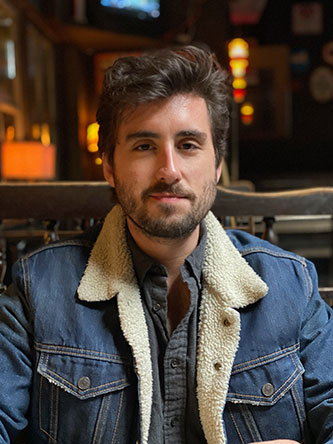Kenneth Michael Spalla '21

Kenneth Michael Spalla '21
High School History Teacher
In what ways do you feel your master’s degree in history has had a positive impact on your life and/or career?
Earning a Master’s degree from Brooklyn College has positively impacted my personal and professional life in a number of ways - some obvious and direct, others, less tangible. The global focus of the History M.A. Program at Brooklyn College is the perfect program for aspiring History educators, especially those that will be teaching Global History in a DOE school. Through courses I took at Brooklyn College I was exposed not only to a diversity of content, but a diversity of perspectives. As the instructional focus for NYC public school history curriculum continues to shift further and further towards emphasizing the experiences of marginalized peoples, steeping oneself in a learning environment that encourages diversity of thought and approach is invaluable. Aside from the expert guidance of the History Department faculty, the History M.A. program also afforded me the opportunity to me and learn from other educators from all over the city. Having the opportunity to enrich my teaching practice through networking with other educators with a passion for history allowed me to adapt and modify my curriculum in ways I otherwise might not have considered. Completing the History M.A. program at Brooklyn College expanded not only my content knowledge, but also my set of instructional tools and methods.
On a personal level, I think that having a strong sense of history is one of the most important skills any person, regardless of career path, can cultivate. Studying history and its associated disciplinary skills is key to being an active and informed citizen and engaged member of the electorate. Recent events in the nation’s capitol have made it exceedingly clear that an honest reckoning of the past is crucial for the maintenance of our fragile democracy. Without a sense of the past, a person is rudderless - they are untethered and free to be tossed about in turbulent waters. Refining our critical thinking, information literacy, and analytical writing - all skills necessary to achieve mastery in this program - are essential in anchoring ourselves in the present and being able to identify and resist destabilizing influences in our personal lives and our communities.
One of the most beautiful aspects of studying history are the continuous revelations of just how connected and interdependent our world is. Brooklyn College’s History M.A. program is designed in a way that supports the development of such understandings. While the program casts a wide net with respect to historical content, students have a tremendous amount of freedom in deciding how they want to pursue their course objectives. Professors clearly spend a significant portion of time familiarizing themselves with the work of their colleagues, meaning that nothing you learn ever stands in isolation. This program is a model of what a History M.A. should provide for graduate students, especially those with aspirations in Education.
Which history course or courses were particularly meaningful to you during your time in the Brooklyn College History Department? Why?
This is a difficult question to answer since I really enjoyed all the classes I took while earning my degree. I have to give special recognition to Professors Mancia and Rawson, not only because their courses were engaging and helped me generate the work for my Graduate Portfolio defense, but also because it was during their classes that we were all forced to make the abrupt shift to fully remote instruction. The transition was seamless and the instruction remained high quality thanks to their flexibility and dedication.
If there were one class I had to single out as being particularly significant, it would be Professor Remy’s Imperial World at War course. This course was my first at Brooklyn College and it set the tone for what the rest of my time in the program would be like. The Imperial World at War is a course that embodies the mission of the History Department at Brooklyn College. We studied global events that are familiar to most folks - the World Wars - but from a unique perspective that enriched and complicated our understanding of these global conflicts. Much of the history that we are exposed to is delivered to us through a white, western-world perspective, which leads us to view non-white actors as secondary characters. The Imperial World at War, like many other courses at Brooklyn College, helped us to move beyond a tired and overly simplistic understanding of things we thought we knew about the world. Courses that help shake up our preconceived notions about the past and expose us to alternative interpretations and storylines are critically important in developing a rich sense of the past, while also preparing us to be members of an increasingly interconnected world. Many of my courses at Brooklyn College accomplished similar feats, but as my first exposure to the program here, Professor Remy’s course made a singular impression.
Are there any other reflections on your time in the BC History Department that you’d like us to include in your spotlight?
The more of yourself you put into your coursework and the programs at Brooklyn College, the more you will get out of it - and Brooklyn College provides exceptional opportunities for you to do just that.






